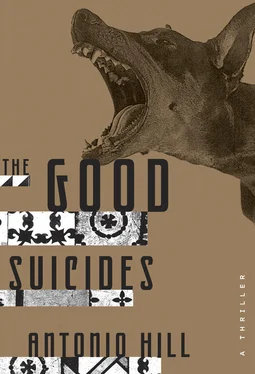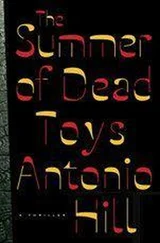Antonio Hill - The Good Suicides
Здесь есть возможность читать онлайн «Antonio Hill - The Good Suicides» весь текст электронной книги совершенно бесплатно (целиком полную версию без сокращений). В некоторых случаях можно слушать аудио, скачать через торрент в формате fb2 и присутствует краткое содержание. Жанр: Триллер, на английском языке. Описание произведения, (предисловие) а так же отзывы посетителей доступны на портале библиотеки ЛибКат.
- Название:The Good Suicides
- Автор:
- Жанр:
- Год:неизвестен
- ISBN:нет данных
- Рейтинг книги:5 / 5. Голосов: 1
-
Избранное:Добавить в избранное
- Отзывы:
-
Ваша оценка:
- 100
- 1
- 2
- 3
- 4
- 5
The Good Suicides: краткое содержание, описание и аннотация
Предлагаем к чтению аннотацию, описание, краткое содержание или предисловие (зависит от того, что написал сам автор книги «The Good Suicides»). Если вы не нашли необходимую информацию о книге — напишите в комментариях, мы постараемся отыскать её.
The Good Suicides — читать онлайн бесплатно полную книгу (весь текст) целиком
Ниже представлен текст книги, разбитый по страницам. Система сохранения места последней прочитанной страницы, позволяет с удобством читать онлайн бесплатно книгу «The Good Suicides», без необходимости каждый раз заново искать на чём Вы остановились. Поставьте закладку, и сможете в любой момент перейти на страницу, на которой закончили чтение.
Интервал:
Закладка:
Antonio Hill
The Good Suicides
Prologue
Lola Martínez Rueda, The Voice of the Others
Thursday, September 9, 2010
“They were a lovely couple,” say the neighbors. “You didn’t see him much, but he always seemed very well-mannered; he’d be friendly and say hello. She kept her distance a little more, perhaps … But she was certainly very devoted to her daughter.” “They had a beautiful baby,” says the owner of a café close to their home, situated in the Clot district of Barcelona, where a few days before, around ten o’clock, Gaspar Ródenas, his wife Susana and their daughter, Alba, fourteen months, were having breakfast. “They came many weekends,” she adds. And without my asking she tells me what they usually had: a black coffee for him and white for her, and how beautiful the little one was. Minutiae, of course. Insignificant details and banal commentaries that now, in light of the facts, are disturbing.
Because in the early hours of September 5, while his wife slept, this “meek but friendly” father rose from the marital bed, entered the bedroom of his only child, put a pillow over her face and squeezed with all his might. We cannot know if the mother awoke, alerted perhaps by that sixth sense that has disturbed maternal sleep since time began. In any case, Gaspar Ródenas, “such a well-mannered” husband according to neighbors and colleagues, didn’t intend to leave her alive either. Susana died shortly afterward, from a single shot to the heart. Then, as the canon of the chauvinist killer decrees, Gaspar gave himself the final shot.
The names of Susana and her daughter have swelled the list of women falling victim to those who in theory should have loved them, respected them and even, if we think of the little girl, protected them. Forty-four women have died in the course of this year (2010) at the hands of their partners. Forty-five, with the macabre addition of a daughter. Maybe this case does not conform to the formula we have learned to recognize: a separation under way, reports of ill-treatment. Gaspar Ródenas wasn’t-such is the irony of life-a violent man.
The State can, for once, stick its neck out and declare that nothing seemed to indicate that Susana and Alba were in danger. And they are right … But that just makes their deaths even more terrible, if possible. Because many of us women already know that mechanisms exist-however scarce and insufficient they may be-to defend ourselves against those men who believe they have a right to control our lives and our deaths. Against those guys who shout at us, put us down and beat us. What we cannot know is how to protect ourselves from the rancor that accumulates in silence, from that mute hatred which suddenly explodes one night and destroys everything.
There is a photo of the three taken just weeks before, on a beach in Menorca. In it Alba can be seen sitting on the shore with a red spade in her hand. She is wearing a little white cap to protect her from the August sun. Kneeling behind her is Susana. Happy, she smiles at the camera. And at her side, with his arm around her, is her husband. Seeing him there, in a relaxed pose, squinting in the sun, no one could have imagined that scarcely a month later this man would use those very hands that are caressing Susana to kill them both.
Why did this thirty-six-year-old man, with a steady, well-paid job in a well-known cosmetics company, with no extraordinary financial burdens and no previous record of any kind, commit murders even more repulsive than others? When did it occur to him to end the lives of his wife and daughter? At what moment did madness overcome him and distort daily reality to the extent of convincing him that death was the only way out?
The answer of his relatives, friends and work colleagues is still the same, although now none of them can believe what they insist on repeating: Gaspar, Susana and Alba were a normal family.
HECTOR
1
For the second time in a short period, Inspector Héctor Salgado turns his head suddenly, convinced someone is watching him, but he sees only anonymous and indifferent faces, people who, like him, are walking on a packed Gran Vía and stop once in a while in front of one of the traditional stalls of toys and games occupying the pavement. It is January 5, the night before Reyes , though no one would think so judging by the pleasant temperature, ignored by some strollers conveniently dressed in overcoats, some even with gloves and scarf as befits the season, happy to participate in a sham of winter lacking the main ingredient: cold.
The parade has been finished for a while and the traffic fills the road under garlands of shining lights. People, cars, the smell of churros and hot oil, all seasoned with supposedly happy carols, their lyrics dipped in surrealism, which the loudspeakers launch against the passersby without the least decorum. It seems no one has bothered to compose new songs, so for yet another year there are the same fucking tidings of comfort of joy. That must be what’s fucked up about Christmas, thinks Héctor: the fact that generally it always stays the same, while we change and grow older. It seems to him inconsiderate to the point of cruelty that this Christmassy atmosphere is the only thing that is repeated year after year without exception, making our decadence ever more evident. And for the umpteenth time in the last fifteen days he wishes he’d flown from all the revelry to some Buddhist or radically atheist country. Next year, he repeats, as if it were a mantra. And to hell with what his son might say.
He is so absorbed in these thoughts that he doesn’t notice that the queue of pedestrians, moving almost as slowly as that of the cars, has stopped. Héctor finds himself at a halt in front of a stall selling little plastic soldiers in bags: cowboys and Indians, Allied soldiers dressed in camouflage ready to shoot from a trench. He hasn’t seen them in years and remembers buying them for Guillermo when he was a kid. In any case, the vendor, an old man with arthritic hands, has managed to re-create an exquisite military scene, down to the last detail, worthy of a 1950s film. That’s not all he sells: other soldiers, the traditional lead ones, bigger and in shiny red uniforms, march on one side, and a legion of Roman gladiators, historically out of place, on the other.
The old man gestures to him, inviting him to touch the goods, and Héctor obeys, more out of manners than any real interest. The soldier is softer than he expected and the feel of it, almost like human flesh, repulses him. Suddenly he realizes that the music has ceased. The passersby have halted. The car lights have been switched off and the Christmas lights, flickering weakly, are the street’s only lighting. Héctor closes his eyes and opens them again. Around him the crowd begins to vanish; the bodies suddenly disappear, evaporate without leaving the least trace. Only the vendor remains at his stall. Wrinkled and smiling, he takes one of those snow globes out from under the counter.
“For your wife,” he says. And Héctor is about to answer that no, Ruth detests those glass domes; they’ve upset her ever since she was a child, like clowns do. Then the flakes clouding the interior fall to the bottom and he sees himself, standing in front of a toy soldier stall, trapped within the glass walls.
“Papa, Papa …”
Shit.
The television screen covered in gray snow. His son’s voice. The pain in his neck from having fallen asleep in the worst possible position. The dream had been so real on Reyes night.
“You were shouting.”
Shit. When your own son wakes you out of a nightmare the moment has come to resign as a father, thought Héctor as he sat up on the sofa, sore and in bad humor.
Читать дальшеИнтервал:
Закладка:
Похожие книги на «The Good Suicides»
Представляем Вашему вниманию похожие книги на «The Good Suicides» списком для выбора. Мы отобрали схожую по названию и смыслу литературу в надежде предоставить читателям больше вариантов отыскать новые, интересные, ещё непрочитанные произведения.
Обсуждение, отзывы о книге «The Good Suicides» и просто собственные мнения читателей. Оставьте ваши комментарии, напишите, что Вы думаете о произведении, его смысле или главных героях. Укажите что конкретно понравилось, а что нет, и почему Вы так считаете.












